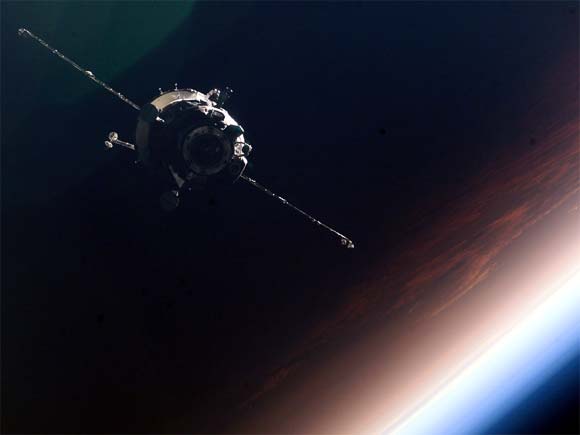[/caption]
Because of stalled legislation that is needed to allow NASA to pay the Russian Space Agency to ferry US astronauts to the International Space Station on board the Soyuz spacecraft, the US section of the space station may have to go unmanned in at least part of 2012. In an interview with
CBS's Bill Harwood
, NASA Administrator Mike Griffin said because of the of the three-year lead time needed to build Soyuz vehicles, contracts must be in place by early 2009. But because of Russia's invasion of Georgia, Congress is unlikely to extend an exemption that allows money to be paid to Russia for high technology goods. Griffin said the problem is very serious, and new legislation would have to be approved within the next few weeks to prevent an interruption in NASA astronauts being on board the ISS.
With the exemption to the Iran-North Korea-Syria Non-Proliferation Act, NASA has been able to buy Soyuz seats for U.S. and international astronauts. While the exemption doesn't expire until the end of 2011, Congress must approve an extension now in order for NASA to place contracts with the Russians by early next year.
Griffin said NASA has been working all year on getting the needed legislation passed. Congress has been aware of the need for a renewal of the exemption for quite some time, as Griffin talked about the importance of the exemption in his testimony during budget hearings last winter.
NASA also is counting on using the Soyuz to bridge the five-year gap between the end of shuttle operations in 2010 and the debut of the Constellation program in 2015. In addition, NASA still needs the Russian Soyuz for rescue capability for the ISS.
"Where it stands is right now," Griffin said of the exemption, "it's dead stalled. Because there's no legislation which is going to come out of the Congress, other than the continuing resolution package, before they recess to go home for elections. And so right now, we're just on dead stop. And of course, the invasion of Georgia didn't help."
"So here's what will happen. The first and most obvious possibility is there won't be any American or international partners on the space station after Dec. 31 of 2011. That's a possibility. Another possibility is that we will be told to continue flying shuttle and we would be given extra money to do so, in which case our Ares and Orion could be kept on track and we would no longer have a dependence on Russia.
"A third possibility is we could be told to keep flying shuttle, not be given any extra money, in which case we don't get Ares and Orion anytime soon and we still have a gap, it's just further out in time."
Asked if he has any optimism a waiver can be in place in time to avoid a gap in U.S. space station operations, Griffin said simply, "no."
"My own guess is at this point we're going to have some period in 2012 where there's no American or international partner crew on station, that there's only the Russians there," he said. "That period always ends three years from when we have a contract with the Russians. So if we can get through all this by June of next year and have a contract with the Russians, then in the latter part of 2012 we can fly a Soyuz flight and restore things to normal."
A transcript of the entire interview is available from CBS News
here.
In the interview, Griffin also talks about the upcoming mission to the Hubble Space Telescope and the recently announced delays for the Constellation Program.
Source:
CBS News Space Place
 Universe Today
Universe Today
